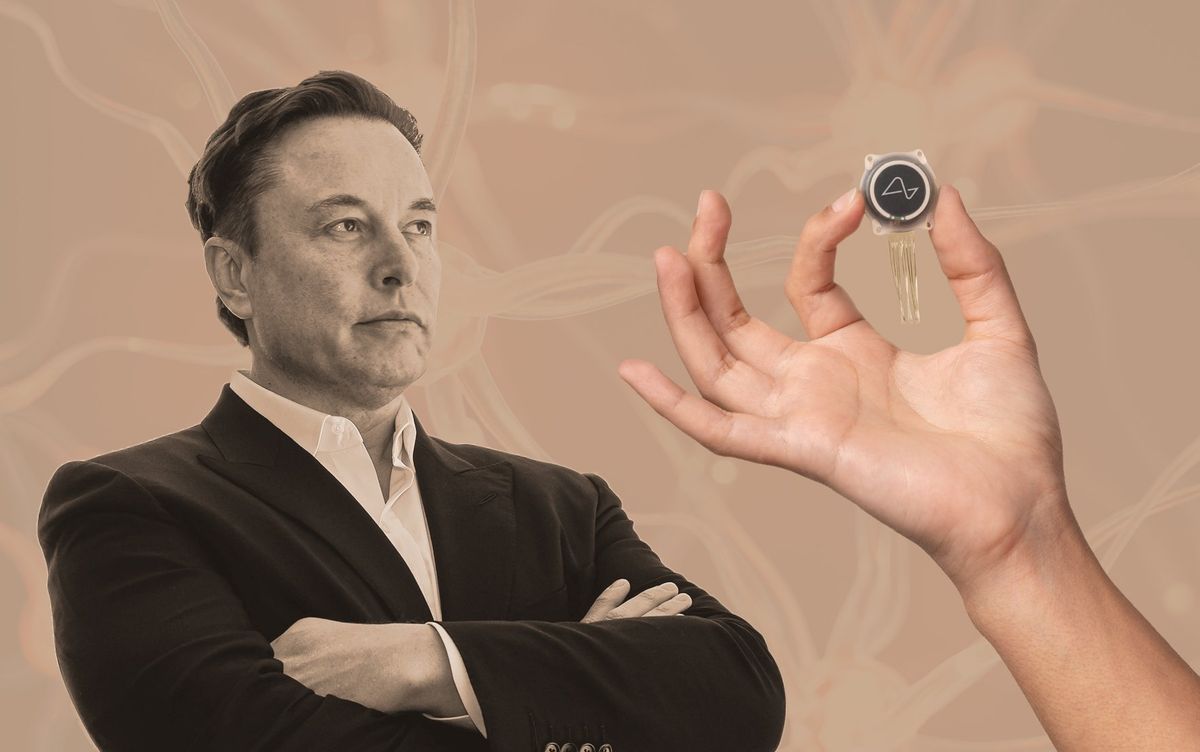UPDATE 30 Jan. 2024: In his characteristically terse and enigmatic style, Elon Musk broke the news last night on his Twitter/X feed that the first human patient has received a brain chip implant from his start-up company Neuralink. The billionaire founder said the product would enable the person to control a computer “just by thinking.”
Musk also announced that the product would be called Telepathy and that initial users would be people who have “lost the use of their limbs.” At press time, neither Musk nor Neuralink had disclosed the identity of the patient, nor the hospital where the surgery occurred, and like many of Musk’s announcements, outside confirmation remained elusive.
“The first human received an implant from Neuralink yesterday and is recovering well,” Musk Tweeted. “Initial results show promising neuron spike detection.”
But Neuralink is hardly the leader in the brain implant field. As Spectrum has reported, New York-based Synchron is, in the words of a feature story in our pages last month, “quietly leading the race to bring a [brain-computer interface] to market” having implanted its chip in ten people with degenerative disease or paraplegia. (See and hear also the latest episode of Spectrum’s “Fixing the Future” Podcast, in which Synchron is considered and discussed.)
Unlike Neuralink, Synchron has publicly disclosed the clinical sites where its procedures were performed, as is customary among biomedical device makers. The company is wrapping up its latest study, with data expected in a few months. Said Nick Ramsey, clinical neuroscientist at University Medical Center Utrecht, in the Netherlands, “[Synchron] might very well be on the market for a while before any [other] devices are competing with it.” —IEEE Spectrum
Original article from 6 Dec. 2023 follows:
U.S lawmakers have urged the U.S. Securities and Exchange Commission (SEC) to investigate Elon Musk for making allegedly false statements about animal testing of a surgically implanted brain chip developed by Musk’s neurotechnology startup Neuralink.
In a letter to the SEC on 21 November, four members of the U.S. House of Representatives pushed the regulators to investigate whether Musk committed securities fraud by misleading investors about the safety of the brain implant and its role in the deaths of at least 12 monkeys, according to separate reports by Reuters and Wired.
Neuralink was rushing and botching surgeries on animals, more than a dozen Neuralink employees allege, in an effort to progress more quickly to human testing.
The allegations come as Neuralink prepares to test the brain implant in humans for the first time. The U.S. Food and Drug Administration (FDA) in May 2023 granted Neuralink approval to conduct human testing, according to Neuralink. The green light came after the agency initially rejected Neuralink’s request in early 2022, according to an investigation by Reuters.
Neuralink’s experimental device aims to give users a way to communicate directly with a computer using only their thoughts—a technology known as brain-computer interface, or BCI. The chip can record brain signals and transmit them to an external app that decodes them into computer commands such as controlling a computer cursor or keyboard. The implant is smaller than a quarter, contains over 1,000 electrode channels, and is placed in the brain by a surgical robot.
In preparing for human trials, Neuralink demonstrated its device, to much fanfare, in monkeys, pigs, and sheep. But a wide range of people have sounded alarms about the company’s approach to testing animals and the safety of the device.
More than a dozen Neuralink employees told Reuters that Neuralink was rushing and botching surgeries on animals in an effort to progress more quickly to human testing. Members of the U.S. Congress have urged federal agencies to scrutinize the company over its animal studies. And the animal welfare advocacy group Physicians Committee for Responsible Medicine says it has been writing to lawmakers and federal agencies about Neuralink for nearly two years.
“There’s an incredible push by Neuralink to bypass the conventional research world, and there’s little interaction with academics, as if they think that we’re on the wrong track.” —Nick Ramsey, University Medical Center Utrecht, the Netherlands
BCI researchers outside of Neuralink also express concerns, telling IEEE Spectrum that Neuralink seems to be moving too secretly and too fast. “I think what concerns people is that Neuralink could be cutting corners, and so far nobody has stopped them,” says Nick Ramsey, a clinical neuroscientist at University Medical Center Utrecht, in the Netherlands. “There’s an incredible push by Neuralink to bypass the conventional research world, and there’s little interaction with academics, as if they think that we’re on the wrong track—that we’re inching forward while they want to leap years forward.”
The U.S. Department of Agriculture’s Inspector General in 2022 opened an investigation into Neuralink’s alleged animal abuse, according to a report from Reuters. The U.S. Department of Transportation in early 2023 also opened an investigation into the company over the potentially illegal movement of biohazardous material, according to the news agency.
In a response to animal-welfare concerns, Musk on 10 September 2023 posted on X, formerly Twitter, that “no monkey has died as a result of a Neuralink implant.” Musk said the company had chosen for its studies terminal monkeys that were “close to death already.”
The lawmakers’ letter indicated that the animals suffered “debilitating health effects” from the implants, including paralysis, seizures, and brain swelling.
Ten days later, the Physicians Committee for Responsible Medicine wrote to the SEC, claiming Musk’s comments were false. The group said it had obtained veterinary records from Neuralink’s experiments showing that at least 12 young, healthy monkeys were euthanized as a result of problems with Neuralink’s implant. The group alleged that Musk’s comments are misleading investors, and urged SEC regulators to investigate Musk and Neuralink for securities fraud.
In November, lawmakers echoed the advocacy group’s complaint in a letter to the SEC that requested an investigation. Their letter indicated that the animals suffered “debilitating health effects” from the implants, including paralysis, seizures, and brain swelling, and that at least 12 monkeys were euthanized “as a direct result of problems with the company’s implant,” according to a review of the letter by Reuters. The request came from Democratic House Representatives Earl Blumenauer of Oregon, Jim McGovern of Massachusetts, and Barbara Lee and Tony Cardenas of California, according to Reuters.
Twelve monkeys sacrificed in the development of a BCI device would be excessive, says Ramsey who notes that he would be “overly surprised” if the accusation turned out to be true. “You don’t test safety in nonhuman primates because they’re much too high in the biological hierarchy. You test safety in sheep.” Functionality of a brain implant may be tested in a few monkeys, but safety should be established in higher numbers of other animals lower in the hierarchy, he says. “It’s very difficult for me to accept the idea that Neuralink would have willingly cut corners that much.”
Last week, Musk held firm to his comments about the causes of the monkeys’ deaths while speaking at The New York TimesDealBook Summit, according to a report from Business Insider. “Neuralink has never caused the death of a monkey,” Musk said at the conference.
Neuralink announced in September that it was recruiting volunteers for its human study. Thousands of people have reportedly signed up to receive the brain implant.
The device is, at least initially, intended for use in people with severe paralysis or degenerative diseases who struggle to communicate due to their conditions. Musk has previously said that he envisions the chip being used by healthy people in an effort to sync their brains with AI.
- 5 Neuroscience Experts Weigh in on Elon Musk's Mysterious "Neural Lace" Company ›
- Neuralink’s FDA Troubles Are Just the Beginning ›
- The Brain-Implant Company Going for Neuralink’s Jugular - IEEE Spectrum ›
Emily Waltz is a features editor at Spectrum covering power and energy. Prior to joining the staff in January 2024, Emily spent 18 years as a freelance journalist covering biotechnology, primarily for the Nature research journals and Spectrum. Her work has also appeared in Scientific American, Discover, Outside, and the New York Times. Emily has a master's degree from Columbia University Graduate School of Journalism and an undergraduate degree from Vanderbilt University. With every word she writes, Emily strives to say something true and useful. She posts on Twitter/X @EmWaltz and her portfolio can be found on her website.



